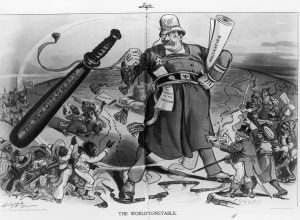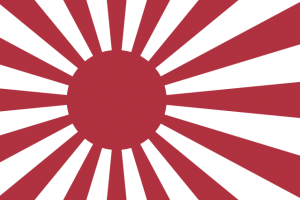How Teddy Roosevelt started the chain of events that led to Pearl Harbor. Retweet
By Perry Willis
I’m reviewing U.S. military history in the run-up to Veterans Day on November 10. I hope to persuade you of three points…
- Our “patriotic holidays” need to honor soldiers without mischaracterizing U.S. wars.
- The claim that U.S. soldiers “defended our freedom” is sweet-sounding but false. Freedom may be what our soldiers wanted to defend, but that’s not how our politicians actually used them.
- We must restrict the ability of politicians to wage war.
As you read what follows please remember this point — I’m not blaming America for anything, but I am blaming U.S. politicians for lots of things. And ask yourself the following questions about each war…
- Did it defend America?
- Did it protect freedom?
- Did it make the world better?
My previous article reviewed the major foreign wars of the 19th Century — the War of 1812, the Mexican War, the Spanish-American War, and the Philippines War. My verdict was harshly negative. None of those wars defended the country or freedom. They were wars of conquest. And the Spanish and Philippines wars, in particular, made the world worse, not better. Now we’ll move into the 20th Century, starting with a little-known episode that justifies asking the following question…
Did Teddy Roosevelt co-found the Japanese Empire?
Related to this question is another — Did Teddy Roosevelt (TR) plant the seeds that eventually led to Pearl Harbor, North Korea, and Mao’s China? The evidence says, “Yes!” The story is told by several historians. Jim Powell gives a good overview of Teddy’s career as a military gangster in Chapter 2 of his book “Bully Boy.” Powell shows that TR…
- Loved war (until his own son died in one)
- Conspired to spark the Spanish-American War in order to build a U.S. empire
- Waged a war of conquest in the Philippines where torture, rape, and murder were used as “military tactics” to subdue the populace
The same ground is covered in more detail in “Honor in the Dust” by Gregg Jones, and in “The War Lovers” by Evan Thomas. But James Bradley takes the case against Teddy even further in his book “The Imperial Cruise.” Bradley uses primary sources to show that TR…
- Subscribed to the same racist Aryan theory that would later animate the Nazis
- Believed that it was the right and duty of Aryans to conquer darker people
- Foreshadowed Hitler by adopting the Japanese as honorary Aryans (Bradley, chapter 6).
- Proposed a Japanese “Monroe Doctrine” for the Western Pacific and encouraged Japan to conquer an empire in that area (Bradley chapter 8).
But Teddy went one crucial step further. He offered up Korea as Japan’s first imperial victim (Bradley, chapter 12). On November 28, 1905, TR closed the U.S. embassy in Korea and turned it over to Japan (page 313). Japan then invaded and conquered Korea. You should remember November 28, 1905 the  same way you remember December 7th, 1941 — both are days of infamy, and one leads to the other. Let’s make the connections and count the costs…
same way you remember December 7th, 1941 — both are days of infamy, and one leads to the other. Let’s make the connections and count the costs…
- TR’s murderous conquest of the Philippines gave the Japanese an imperial model to emulate. His actions also robbed the U.S. of the moral high ground. We could no longer consistently oppose empire building.
- TR’s proposal of a Japanese “Monroe Doctrine” for the Western Pacific morphed into what the Japanese later called their Greater Asia Co-prosperity Sphere. That was Japan’s euphemistic name for their blood-drenched conquests.
- TR’s betrayal of Korea essentially co-founded the Japanese empire. It also created a mainland base to support Japan’s later invasion of China. Japan’s aggression against China then led to FDR’s eventual retaliation against Japan which then led to Pearl Harbor and a greatly expanded World War 2.
- The way U.S. politicians then fought World War 2 caused the creation of North Korea and Red China, leading to millions of deaths.
Does TR deserve the primary blame for all these calamities? No, Japanese politicians bear far greater responsibility. But TR made a huge negative contribution. Sadly, many people will try to excuse TR on the grounds that most people back then were racist and militarist. But in fact, 250,000 Americans*, including luminaries like Mark Twain and former President Grover Cleveland, joined together in the Anti-imperialist League to fight against TR’s crimes. This shows that many people from that era could tell the difference between right and wrong. If they could, then Teddy could too. He simply chose to do evil instead.
Bottomline: Teddy Roosevelt’s wars and interventions did not defend America or freedom. They did not make the world a better place. They made the world profoundly worse, setting in motion events that would later slaughter millions of people. Now imagine a world where…
- U.S. politicians set a good example for the Japanese by not conquering an empire
- Teddy Roosevelt did not encourage Japan to create its own empire
- Teddy Roosevelt did encourage Japan to be peaceful
- Teddy Roosevelt did not betray Korea
- The Japanese did not conquer Korea or invade China
- There was no Pearl Harbor attack, and no North Korea or Red China
Would you rather live in that world, or the world Teddy Roosevelt helped create?
We’ll continue with the wars of the 20th Century starting with the next article in this series. If you find these articles valuable, please share them with others. Start a conversation about the correct way to honor veterans and the war dead. We believe it should be possible to honor their courage and mourn their loss, without telling lies about how the political class misused them. And if you’re new to our work, and you like what you see, please subscribe using the form near the bottom of our homepage! It’s free!
Perry Willis
Co-founder, Downsize DC
Co-creator, Zero Aggression Project
P.S. The next article will review U.S. involvement in World War 1. Here is the list of books we’ve consulted so far in this series. If you buy these books using the links below, we’ll get credits we can use to expand our research library. Thank you for your interest and support.
Bully Boy by Jim Powell
A Wicked War by Amy S. Greenberg
The Politics of War by Walter Karp
The War Lovers by Evan Thomas
Honor in the Dust by Gregg Jones
The Imperial Cruise by James Bradley
NOTE: The figure of 250,000 members of the Anti-imperialist League comes from Johnson, Robert David. “Anti-Imperialism.” Oxford Research Encyclopedia of American History. 2015-10-05. Oxford University Press.



7 Comments
IT SOUNDS LIKE A LONG HISTORY OF THE DEMO-REPUBLICANS BEING. SOCIAL ENGINEERING POWER MONGER CONTROL FREAKS. HERE AND ABROAD. IN OTHER WORDS NANNIES STATIST. BIG BROTHER.
ITS STILL GOING ON TODAY. NO DIFFERENCE.
HOW CAN I STOP PEOPLE FROM BUYING THE BULL FROM ON HIGH.???
I do not know of any moral reason why we had to go to war in WW1 or our civil war. I do not understand why every 20 years or so we have to make plans to send our young folks into a meat grinder.
Missing from the analysis is the role of propagandists in all of this empire-building. Aryan race myths did not happen by sheer accident. The Christian majority were taught by their churches, that as Christians that had a duty to love others and to spread the Gospel of Christ, who was himself Jewish. So from where did this theory spring, that pale people from Northern Europe should hate Jews and should conquer the planet’s pigmented people and rule them? And how did this theory come to dominate the public discourse, so that even the memory that there had been resistance to it, is now forgotten?
A.E. Samaan’s short article, “Harvard and the Holocaust” (which you can read at http://www.academia.edu/3091739/Harvard_and_the_Holocaust ) gives the surprising answer. A gang of university professors, founded by a nephew of biologist Charles Darwin who was trying to cash in on the Darwin family name, concocted the theory and used the growing prestige of their institutions, to spread the racist theory, even though they knew for a fact that their theory was false.
In retrospect, the key question is not why the Civil War was fought. The key question is whether it truly ended, or simply moved underground and became a parasitic growth that destroyed life and liberty everywhere it went.
Interesting stuff Bob. Thanks for the link.
BTW, The Imperial Cruise also makes much of the Harvard-Ayran connection, and its influence on T.R., who was a student there.
No mention of how Japan became a powerful country in the 1st place. Over 1/2 of the $ used to finance the Japanese Navy came from Wall Street financiers. Jacob Schiff was even awarded several of Japan’s highest medals, Order of the Rising Sun and Order of the Sacred Treasure.
Another detail of the story:
By 1898, newspaper tycoon William Randolph Hearst (seconded by his slightly classier rival, Joseph Pulitzer) had brought yellow journalism to a peak of effectiveness with agitation to seize Cuba, Puerto Rico, and the Philippines from Spain under the pretext of aiding anticolonial rebels, whose aspirations for independence the United States brutally suppressed as soon as it won the war.
On February 15, 1898, the U.S. battleship Maine exploded and sank in Havana harbor, killing 266 sailors. The yellow press blamed a mine placed on the hull by Spanish divers, and popular fury made the Spanish-American War a done deal. It was the era’s 9/11.
Two commissions of government investigators failed to find a definitive cause for the explosion, however. Both could do no better than theorize that spontaneous combustion had produced a fire in a coal bunker that had somehow burned without the awareness of a full crew until it had set off a nearby powder magazine. However, there is another explanation. The adventurer William Astor Chanler, a protégé of the chief warmonger, Assistant Secretary of the Navy Theodore Roosevelt, had been smuggling guns to the Cuban rebels; he served in the U.S. Army during the war, and was a New York Congressman from 1898 to 1904. On page 364, note 51, of Cuba; or, The Pursuit of Freedom (New York: Plenum Press, 1971; Da Capo Press, 1998), British historian Hugh Thomas states that, shortly before his death on March 4, 1934, Chanler confessed to the U.S. ambassador to France, William C. Bullitt, that he had organized a plot in which an American diver placed a mine on the hull near a powder magazine and blew up the ship. (The navy wanted to replace the Maine in any case, because it was so poorly designed and topheavy that firing a full broadside would have capsized it.) For another summary of the story, see (of all places) Bo Beolens, Michael Watkins, and Michael Grayson, The Eponym Dictionary of Mammals (Baltimore: Johns Hopkins University Press, 2009), pages 74–75. Thomas discounts the admission, calling it the Cuban illusion, but he provides no reasoning for this conclusion nor any evidence for an alternative explanation, and later in the book (page 385), he implicitly grants it plausibility but declines to say so or think about what it means.